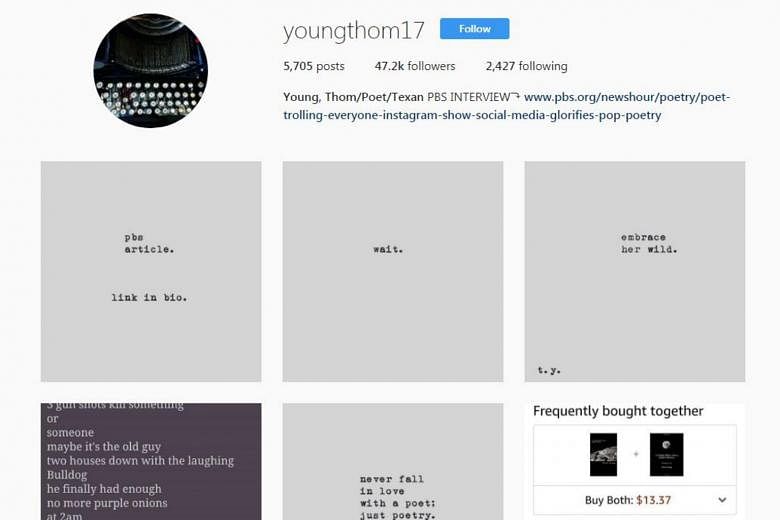"love made / her wild."
Those four words could not be considered a full poem. But American poet and English teacher Thom Young posted them to his Instagram account, along with several other "short, trite" verses, in a social media experiment.
In under a year, his follower count rose from 9,000 to 46,000, with each post averaging between 1,000 and more than 2,000 likes.
An award-winning American poet, Young said in an interview with American broadcaster PBS that he wanted to satirise the rise of what he calls "pop poets" on Instagram: individuals who post simple lines with little depth or meaning and amass large followings, as opposed to those who write lengthier and less "simplistic" works.
His experiment is testament to how this formula works - one of his parody poems, simply the word "wait" over a grey background, has more than 2,000 likes on Instagram.
While many such poets remain on online platforms like Instagram or Tumblr, several have migrated into the publishing world. Writers such as Lang Leav and Rupi Kaur first found their place online, with short poetry much like the kind Young parodies, and now have bestselling books to their name.
Such poets have garnered both ardent followers and critics, with Young falling into the latter category.
"I think people today don't want to read anything that causes a whole lot of critical thinking," he told PBS.
In his satirical works, which include seemingly empty statements like "her stars / are in / her eyes", he makes it a point to state that these poems are parodies in the captions of the posts. Yet a number of his followers see the work as entirely serious, and appreciate it as such.
Beyond the humour of his posts, Young also wanted to expose the people who follow him online to what he sees as "real poetry", including canonical writers like Oscar Wilde.
Yet not every reader agrees with this definition of "real poetry", especially younger audiences who consume the kind of work that Young seems to make fun of. Rather than for literary value, many read such poets for their ability to create emotionally relatable poetry.
Addressing the possibility that such readers would consider his experiment condescending, Young told PBS that he did not want to criticise their tastes, but rather make them "think more about what they read".

